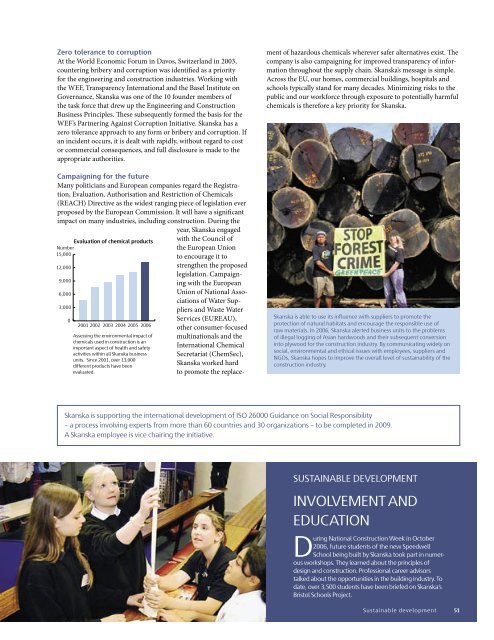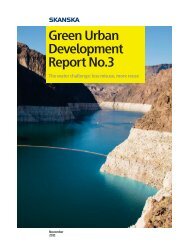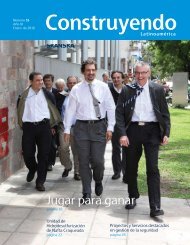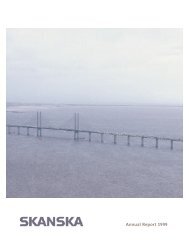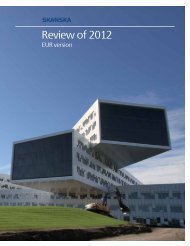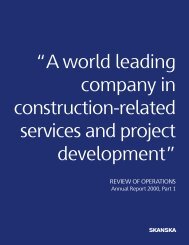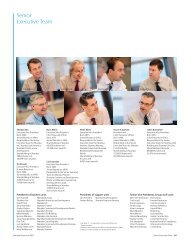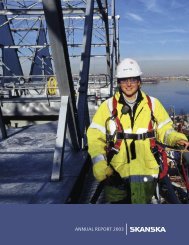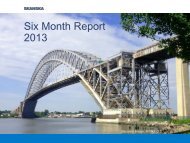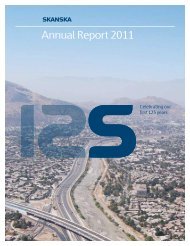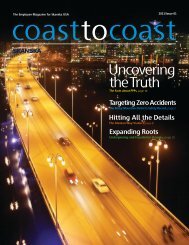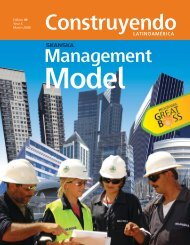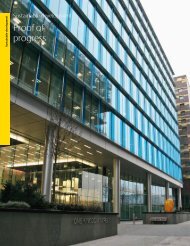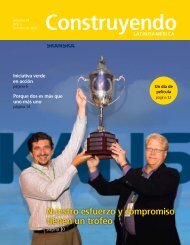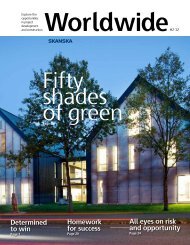ANNUAL REPORT 2006 - Skanska
ANNUAL REPORT 2006 - Skanska
ANNUAL REPORT 2006 - Skanska
You also want an ePaper? Increase the reach of your titles
YUMPU automatically turns print PDFs into web optimized ePapers that Google loves.
Zero tolerance to corruption<br />
At the World Economic Forum in Davos, Switzerland in 2003,<br />
countering bribery and corruption was identified as a priority<br />
for the engineering and construction industries. Working with<br />
the WEF, Transparency International and the Basel Institute on<br />
Governance, <strong>Skanska</strong> was one of the 10 founder members of<br />
the task force that drew up the Engineering and Construction<br />
Business Principles. These subsequently formed the basis for the<br />
WEF’s Partnering Against Corruption Initiative. <strong>Skanska</strong> has a<br />
zero tolerance approach to any form or bribery and corruption. If<br />
an incident occurs, it is dealt with rapidly, without regard to cost<br />
or commercial consequences, and full disclosure is made to the<br />
appropriate authorities.<br />
Campaigning for the future<br />
Many politicians and European companies regard the Registration,<br />
Evaluation, Authorisation and Restriction of Chemicals<br />
(REACH) Directive as the widest ranging piece of legislation ever<br />
proposed by the European Commission. It will have a significant<br />
impact on many industries, including construction. During the<br />
year, <strong>Skanska</strong> engaged<br />
Evaluation of chemical products<br />
Number<br />
15,000<br />
12,000<br />
9,000<br />
6,000<br />
3,000<br />
0<br />
2001 2002 2003 2004 2005 <strong>2006</strong><br />
Assessing the environmental impact of<br />
chemicals used in construction is an<br />
important aspect of health and safety<br />
activities within all <strong>Skanska</strong> business<br />
units. Since 2001, over 13,000<br />
different products have been<br />
evaluated.<br />
with the Council of<br />
the European Union<br />
to encourage it to<br />
strengthen the proposed<br />
legislation. Campaigning<br />
with the European<br />
Union of National Associations<br />
of Water Suppliers<br />
and Waste Water<br />
Services (EUREAU),<br />
other consumer-focused<br />
multinationals and the<br />
International Chemical<br />
Secretariat (ChemSec),<br />
<strong>Skanska</strong> worked hard<br />
to promote the replace-<br />
ment of hazardous chemicals wherever safer alternatives exist. The<br />
company is also campaigning for improved transparency of information<br />
throughout the supply chain. <strong>Skanska</strong>’s message is simple.<br />
Across the EU, our homes, commercial buildings, hospitals and<br />
schools typically stand for many decades. Minimizing risks to the<br />
public and our workforce through exposure to potentially harmful<br />
chemicals is therefore a key priority for <strong>Skanska</strong>.<br />
<strong>Skanska</strong> is able to use its influence with suppliers to promote the<br />
protection of natural habitats and encourage the responsible use of<br />
raw materials. In <strong>2006</strong>, <strong>Skanska</strong> alerted business units to the problems<br />
of illegal logging of Asian hardwoods and their subsequent conversion<br />
into plywood for the construction industry. By communicating widely on<br />
social, environmental and ethical issues with employees, suppliers and<br />
NGOs, <strong>Skanska</strong> hopes to improve the overall level of sustainability of the<br />
construction industry.<br />
<strong>Skanska</strong> is supporting the international development of ISO 26000 Guidance on Social Responsibility<br />
– a process involving experts from more than 60 countries and 30 organizations – to be completed in 2009.<br />
A <strong>Skanska</strong> employee is vice chairing the initiative.<br />
SUSTAINABLE DEVELOPMENT<br />
INVOLVEMENT AND<br />
EDUCATION<br />
During National Construction Week in October<br />
<strong>2006</strong>, future students of the new Speedwell<br />
School being built by <strong>Skanska</strong> took part in numerous<br />
workshops. They learned about the principles of<br />
design and construction. Professional career advisors<br />
talked about the opportunities in the building industry. To<br />
date, over 3,500 students have been briefed on <strong>Skanska</strong>’s<br />
Bristol Schools Project.<br />
<strong>Skanska</strong> Annual Report <strong>2006</strong> Sustainable development 51


